#novel premise
Text
cosmic horror abomination that is aeons old wants to claim a human-passing god as its spouse, so that together they may fuse their powers and devour the stars, but she's just turned 18 and her overprotective brother's primary objection is the age gap
#book 4#novel premise#am writing#brainstorming#why am i writing this series#i think i need help#cosmic horror but sexy#lovecraftian mythos#lovecraft gods but dtf
8 notes
·
View notes
Text
there really are few emotions i find more compelling in a story than "you should be afraid of me. please don't be afraid of me"
#this is why i will never forget that moment in Exit Strategy when Mensah grabs MB by the collar and tells it *No*#murderbot#this was also the core premise of a character in#my novel wip that shall remain unnamed#probably more characters i'm forgetting about#fun tropes#tropes#stars rambles
20K notes
·
View notes
Text
The Hero That Shouldn't Have Been
Premise;
In the land of Lycaon there lies a curse, that had claimed countless generations of the royal family of Aereus. And once again with the once noble warrior king nearing death it seems as if the curse will once again tear through their family.
Only Princess Sybella seems to have a plan; summon the nearly unknown knight Sir Maverick to slay a beast known as the Ravenous Cat holding the neighboring nation hostage in it's fearsome grip. It is an almost perfect plan on paper until through accident and happen stance the great knight Sir Maverick is badly injured leading his somewhat green but good hearted pupil Sir Owen to rise to the challenge.
May fate and prophecy have mercy upon his soul.
#series: the hero that shouldn't have been#novel premise#original writing#with god and tumblr as my witness i fucking swear this story was meant to be a joke#also not even going to lie if i keep up with this story i swear that it will probably change into something hopefully better#but until then this is the best i got
0 notes
Text
What is Ms. Orange about?
After moving to a safer city, a woman finds out that she and everything else around her is fictional. Wishing for a peaceful life and wanting to be free from a superior being's control, Orange will try to stop the author from developing a story for the book, since a plot would mean that her whole life is already decided for her and no action she takes will ever be her own. With the help of a group of teenagers, she will try to achieve her goal by using her knowledge to subvert clichés. At the same time, the author will insert any conflict into the story with the aim that Orange eventually gives up and fully submits to the role that has been planned for her.
It's a fantasy novel with science fiction and metafiction elements, and it is mostly filled with comedy. The main themes are reality vs. fiction, obedience vs. rebellion and adolescence.
#my post#ms orange#novel writing#novel wip#novel premise#writers on tumblr#first translated post from the writing blog#the next post will focus on the setting#feel free to ask questions (as long as they don't imply giving spoilers)#i think i should mention that the novel has an episodic structure because most of the chapters have a self-contained story#but they are all loosely connected#if it were a cartoon each chapter would be its own episode
0 notes
Text
sorry but I don’t think there’s a heterosexual reason why Gene Roddenberry himself wrote a scene where Spock admitted to feeling Jim’s thoughts to the crew, clarified to the reader that Vulcan’s can only feel the thoughts of someone you’re intensely close with and then having Spock think “oh god I just admitted I love him”
#star trek#star trek the motion picture#star trek the motion picture novel#star trek tos#the premise#dyl posts
827 notes
·
View notes
Text
love
song: francesca - hozier
#my posts#my edits#st#tos#spock#star trek tos#star trek the original series#star trek aos#star trek edit#aos#star trek video#s'chn t'gai spock#mr spock#kirk#captain kirk#jim kirk#james t kirk#mccoy#doctor mccoy#leonard bones mccoy#spirk#mcspirk#k/s#kirk/spock#spirk edit#spones#the premise#star trek the premise#star trek the motion picture novel#wrath of khan
547 notes
·
View notes
Text
The more I think about it, the more I think that Persuasion has my favorite premise of all of Jane Austen's novels
Anne Elliot as a character speaks to my soul. She feels tremendous guilt for a decision she made eight years ago. Her life is lonely, as she doesn't really have anyone she can truly confide in despite being surrounded by people. So she swallows her pain, the yearning she feels deep in her soul, and vows that if nothing else at least she'll be helpful.
And of course she is reunited with Frederick Wentworth (the one that got away) who seems to hate her now, and she just keeps going. She keeps being kind and supporting her loved ones while slowly carving out a life for herself. There's something about her classic heroism that just feels so attainable. I don't have Elizabeth Bennett's wit, or Jane Bennett's unwavering belief in the goodness of everyone, or even Elinor's constant composure. But I can be like Anne and just keep moving forward attempting to be helpful
Of course it all works out in the end, and Anne is finally surrounded by people who truly appreciate her, even if she had to wait an extra eight years. Others have observed the fairy tale quality of the ending, and perhaps that's why it speaks to me. The idea that if you just keep doing your best and being kind, you'll eventually find happiness
#Would I say that Persuasion is my favorite of Jane Austen's novels?#I don't think ss#Pride and Prejudice is her most well written in my humble opinion#and i do with persuasion had more characters that were fully interesting individuals#and of course I would love more of an actual period of time where Anne and Wentworth are together in the narrative#since we never see what they're like as a happy couple or before their separation#(unlike Austen's other couples where you can see hints of their dynamic before they're together)#but the premise of persuasion is just so beautiful#persuasion#anne elliot#pride and prejudice#jane austen#cottagecore-raccoon
919 notes
·
View notes
Text
modern au; nonbinary steve
dustin bullies steve into playing their favorite MMO with them. to Dustin's disgust, Steve's favorite part is collecting all the different cosmetic items and making cool fantasy outfits for his avatar. unbeknownst to the party, steve creates an alt account where he can collect the female outfits and wigs, because there's a bigger selection and they're much prettier.
as Steve interacts w people on his new account, he realizes he likes it better-- for one, people pay attention to women in a way he isn't used to. not all of it is good attention, but steve relishes in it. also, he likes that people see him as a woman. he likes that they don't even think about it. quickly he joins a guild and actually starts playing the game in earnest, just so that he has these relationships with people who view and treat him as a woman.
he meets Eddie there. Eddie is charming and flirtatious with everyone, men and women, but it's clear that Steve is his favorite. Very carefully, Steve becomes closer and closer to Eddie-- close enough that Steve is full of guilt.
He feels like he's lying to Eddie about who he is, even though he's told the truth about everything but his gender. Even worse is the realization that he doesn't ever want Eddie to think of him as man-- which is confusing, because steve isn't exactly comfortable with someone he's falling in love with thinking of him as a woman.
Things get even worse when, after Steve drunk texts Eddie after a night out with Robin, they start sexting. Its fun, casual flirtation, nothing too serious, but Strve realizes he likes the idea of sex better as his alternate self. He likes pretending to have tits, he likes imagining what it would be like to have a cunt, he likes talking about wearing lingerie and being Eddie's good girl.
He thinks he can't come clean without losing the best thing he's ever had, so Steve pushes his guilt down and pretends he's not in love.
Of course he gets caught out, eventually. Dustin and Eddie become friends in real life and Eddie isn't an idiot. Steve is mortified and distraught, but once Eddie is sure that this wasn't all a cruel prank, he's quick to assure Steve that nothing has to change-- Knowing that in real life Steve has broad shoulders and a square jaw doesn't make him any more of a "man" than his online avatar makes him a "woman". Not if that's not what Steve wants.
So Steve doesn't have to give anything up. He gets to keep his amazing, supportive boyfriend. He gets to keep his pretty clothes and avatar. He gets to keep experimenting in the bedroom, finding out what makes him happy instead of what he thinks he should be doing.
And he gets more, things Steve never even dreamed of having: He gets to start buying pretty clothes in real life, too, and they hang next to his polos like they belong. He gets to grow out his hair. He gets to slowly find out what he likes, how he wants people to think of him, how he wants to think of himself.
#shut up az#steddie#catfishing in MMOs is a v common premise in East Asian m/m fiction#and I was reading like. The 12th one this year and thinking about what a narrative would look like if the catfishing wasn't done out of#Idk maliciousness or awkwardness but instead out of like a n exploration of gender#obviously someone in China isn't going to be allowed to write that but maybe one day I'll get a Japanese novel about it#however steddie seemed like a good conduit to get the thoughts put of my head
262 notes
·
View notes
Text
Okay, hold on, here's the thing. We as a fandom seemed to have collectively agreed that Killing Time is the gayest Star Trek novel, but I am beginning to FIRMLY disagree with that; partially because I read Killing Time and I didn't really like it that much, but also because I'm currently reading The Price of The Phoenix and it is 100000× GAYER. It's also really beautifully written.
Anyways, here's part two of this book being so gay and so fucking romantic it hurts.
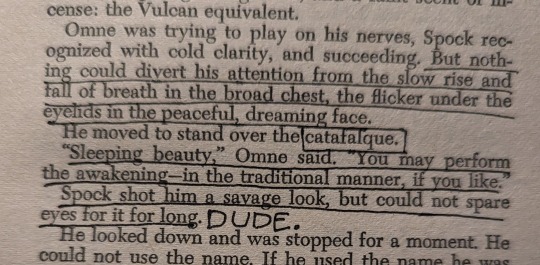
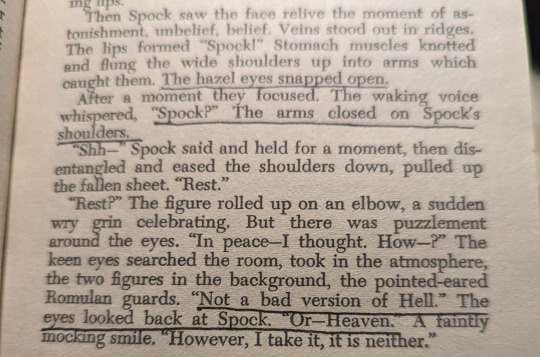
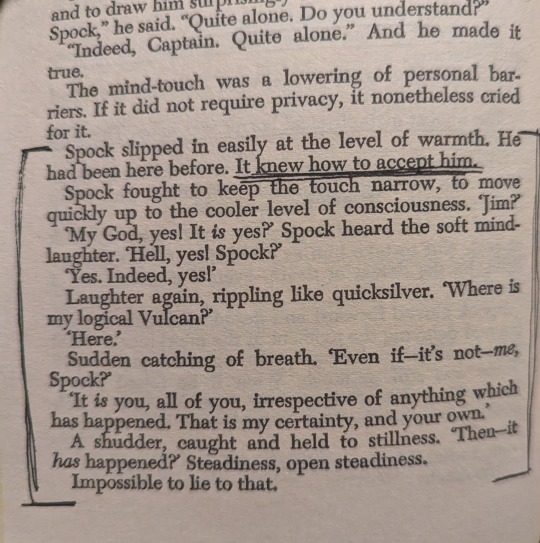
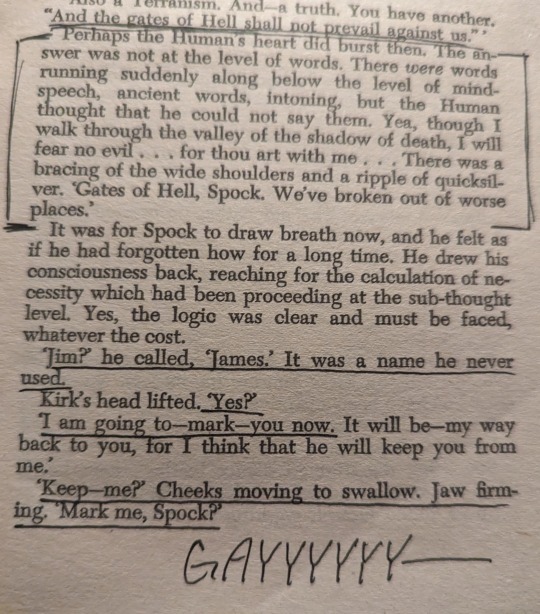
#jesus christ#they need to get a room#star trek#spirk#axel rambles sometimes#star trek tos#spock#mr spock#s’chn t’gai spock#tos spock#commander spock#kirk#jim kirk#james kirk#james t kirk#tos kirk#captain kirk#star trek novels#st novels#the premise#k/s#the price of the phoenix
699 notes
·
View notes
Text

Promises to Keep | Shelley Butler, 1995
Read Jenna Sinclair's full novel, which this art was created for, here! I cannot recommend it enough :)
#spirk#spock#captain kirk#james t kirk#jim kirk#fan art#fanzines#vintage#star trek#star trek the original series#star trek tos#sci fi#science fiction#k/s#the premise#fanfiction#fan novel#jenna sinclair#shelley butler#lgbt#fandom history#fic rec#spirk fic
157 notes
·
View notes
Text
A gimmick which I think would be interesting in a visual novel: small variation in the visual designs of the sprites and backgrounds based on who's narrating a given scene. Not large variations, mostly—buildings are going to have generally the same architecture, people are going to have generally the same outfits, et cetera—but lots of details shifting around on the margins, showing the texture of the characters' thought-processes through the visual design of the world as they see it, rather than only through the text of their narration.
So, for example, one could have one viewpoint character be unusually faceblind, and portray this by having all the sprites have Same-Face Syndrome when viewed from their perspective, even as they hold onto more variation face-wise in everyone else's perspectives. One could have one viewpoint character who's unusually conscious of the fine details of their physical environment, and portray this by drawing the environment-art with much more fiddly detail when in their perspective, showing wood-grain and electrical wiring and other such things which are abstracted away in others' perspectives of the same areas. Et cetera.
#Archive#Visual Novels#Premises#there's also some room once the pattern has been established on the small scale to go more intense about it#one character just sort of never seeing the building that's the big landmark for everyone else or something#but making that too prominent will end up leaving you with something less like this-idea-in-its-basic-form and more like saya no uta#and for all that i in fact liked says no uta itself it's definitely not particularly about the-thing-this-idea-in-its-basic-form-is-about#so there's a bit of a balancing act there#(the thing this idea is about being largely 'people vary widely in which bits of the world they tend to notice / pay attention to')#(in a mundane way as opposed to just a magical-perception-filtering way)
176 notes
·
View notes
Text






imagine working retail in a whimsical fantasy video game open world. i’d be pissed too
#also that’s the premise of my wip novel#retail worker in video game esque world is so depressed that she goes on a quest to undo the past several years of like the entire world#not caring about the consequences or loss of life/memories#she and volo would get along :)#pokemon#pla#pokemon legends arceus#volo#volo pokemon
79 notes
·
View notes
Text
you're telling me its CANON that not only was hearing V'ger call out to him why Spock left vulcan in the motion picture
but he also heard jim consciousness from fucking EARTH!?!?!
#im sorry that shit is WILD#reading the novelization for the first time and we're already off to a very gay start#star trek#star trek tmp#star trek the motion picture#spirk#k/s#the premise
117 notes
·
View notes
Text
I was thinking about how Spock is intentionally paralleled with Sydney Carton from A Tale of Two Cities in The Wrath of Khan, and now I am unwell!
At the beginning of the movie, Spock famously gives Kirk A Tale of Two Cities as a birthday present. This book was specifically included for its themes of sacrifice and resurrection, which obviously mirror Spock’s decision to give up his life to save the crew. Notably, Kirk’s final lines reference the famous closing of the novel.
Kirk: It is a far, far better thing I do than I have ever done before... a far better resting in place I go to than I have ever known...
Carol: is that a poem?
Kirk: Something Spock was trying to tell me. On my birthday.
So what’s the importance of this line? The famous “far better thing” quote is from the book’s ending when Carton has just sacrificed himself for his beloved Lucie, giving himself up to be executed in place of her husband so that she may find happiness. (Live long and prosper, anyone?)
Interestingly, both Spock and Carton are emotionally repressed characters, and anguish over the depth of their love for the people who uniquely see them for who they are — in this case, Jim and Lucie. While I’d argue that Spock is more at peace with himself and his feelings for Jim after the events of the first movie, the point still stands that Jim is the one to truly understand him in a world that labels him as a cold and calculating being.
I believe that this is what Kirk’s line calling Spock’s soul “the most human I have ever encountered,” is supposed to represent. (Even though I agree with the criticism that it could have been worded better!) Similarly, Lucie is the one to recognize Carton’s inner nature in spite of his aloof facade, begging “I would ask you to believe that [Carton] has a heart he very, very seldom reveals, and that there are deep wounds in it.” (Book 2, Chapter 20.)
When Carton finally admits his love to Lucie, it’s hard not to see the resemblance to Spock’s dilemma in the first movie. You know, that time when Spock, in his heartbreak over something related to Jim (that were not given an explanation for), cries out “Jim! Good-bye my . . . my t’hy’la. This is the last time I will permit myself to think of you or even your name again!” before attempting to purge himself of all feelings in an ancient ritual, and failing because the Vulcan priestess can totally sense that he’s still thinking about Kirk. (Yup, that totally straight time!)
Well, Carton is in a similarly agonizing predicament, because he can’t get his feelings for Lucie to go away. He tells her, “I break down before the knowledge of what I want to say to you” and “I have had the weakness, and have still the weakness, to wish you to know with what a sudden mastery you kindled me, heap of ashes that I am, into fire—a fire, however, inseparable in its nature from myself, quickening nothing, lighting nothing, doing no service, idly burning away.” (Book 2, Chapter 13)
He also expresses that he could never separate his love for her from himself, saying that “Within myself, I shall always be, towards you, what I am now.” (Book 2, Chapter 13) Yeah, I know the fact this mirrors Spock’s famous “I have been and always shall be yours” is probably a coincidence, but I’ll be damned if I don’t mention it.
Finally, Carton expresses his love for her in his willingness to sacrifice himself for her sake: “For you, and for any dear to you, I would do anything. If my career were of that better kind that there was any opportunity or capacity of sacrifice in it, I would embrace any sacrifice for you and for those dear to you… there is a man who would give his life, to keep a life you love beside you!” (Book 2, Chapter 13.) Of course, Carton’s story ends when he sacrifices himself for her, fulfilling this promise. Hmm, now who else does that sound like?
This is definitely not a perfect parallel: Spock doesn’t start out as a lazy alcoholic, although there is an argument to be made that Carton’s low self-worth reflects Spock’s before he went on his conversion therapy fueled journey of self discovery. Additionally, I wouldn’t say that Spock’s love for Kirk is unrequited like Carton’s for Lucie, (as evidenced by many things, but I’ll primarily point to the events of The Motion Picture and The Search for Spock), but you could potentially cast Carol in the role of Darnay, Lucie’s husband.
The most important thing to glean from this is that Spock was very deliberately set up to be the Carton figure, which is interesting given that Carton’s actions are driven by his willingness to do anything to see his beloved be happy and prosper.
#spirk#k/s#the premise#kirk/spock#my post#the wrath of khan#star trek ii: the wrath of khan#star trek the wrath of khan#star trek: the original series#star trek tos#meta#analysis#I have been and always shall be yours#t’hy’la#star trek the motion picture#star trek the motion picture novelization#star trek tmp#james t kirk#tos spock#s’chn t’gai spock#a tale of two cities
76 notes
·
View notes
Text
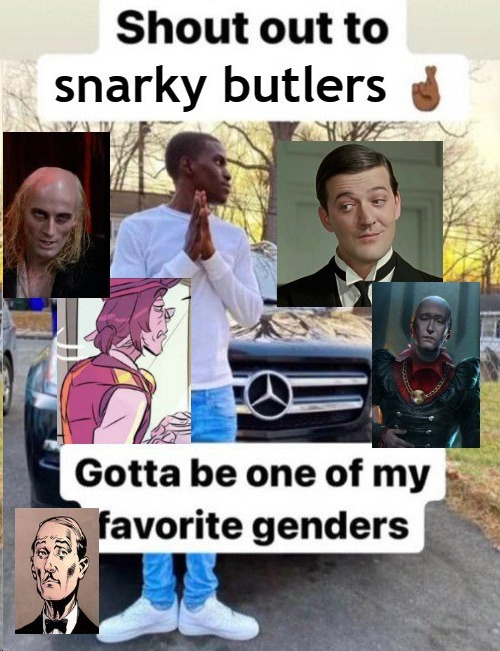
#im gnawing on hte bars of my cage. same person different fonts#jeeves and wooster#riff raff#haskill#alfred pennyworth#taz jenkins#im like one of those people who reads the same romance novel premise over asdfggfhnGHDJHF
166 notes
·
View notes
Text
spock crying in the the motion picture novelization
as i was watching star trek the motion picture today, i found myself wondering how closely it and the book align only to find that the essential scene, the thesis statement of the tmp story, where spock draws a direct parallel between v'ger and himself while crying is simply... not in the book. i know the version that's more widely available now is the director's cut and that said scene wasn't even in the original theatrical release, but the movie is simply incomplete without it. so! i decided to write out the scene as if it were in the book! please enjoy my take on a prose version of spock's beautiful speech
“Spock?” Then, when his Science Officer did not answer, “Mr. Spock.”
Kirk rose from the captain’s chair and made for the console where Spock sat, facing away from him towards the screen that displayed Vejur’s activity.
“I think -" Kirk began.
Then, Spock turned towards him in his chair, hand releasing from its resting place against the thin line of his mouth. He was — crying. A single, shimmering tear was streaking down his left cheek. His eyes, usually so dark and, since his return from Vulcan, so indecipherable, now shone brightly under the dim, warm light of the bridge. His eyebrows crinkled inwards, not in contemplative thought but, and Kirk would have never guessed, worry. It seemed that open, unashamed emotion left over from Spock’s mind meld with the intruder had not yet dissipated, though Kirk was unsure if Spock’s tears were more Vejur’s than his own.
Spock nodded his head, lifting it a little towards his captain, slightly accusatorily. There was no attempt to hide, no apologetic aversion of gaze. It seemed as if he were telling Jim, “Yes, believe what you are seeing, Captain.
“I have returned.”
Kirk felt McCoy step into place at his side, the doctor’s eyes settling on the now multiple tears pooling down Spock’s face. The captain shared a look with McCoy, acknowledging their mutual concern and astonishment towards their friend.
“Not for us,” Kirk finally stated.
“No, Captain. Not for us.” Spock’s voice, if perhaps a little softer than usual, was confident, steady, calm. Certain. “For Vejur.”
Spock raised his hands, intertwining the fingers in a familiar, thoughtful gesture, but kept them suspended in the air, fidgeting.
Commander Decker approached, too, eyebrows furrowing as he took in the image before him. Kirk showed no sign of acknowledging his presence, the captain’s attention entirely focused on his friend.
“I weep for Vejur as I would for a brother," Spock continued. "As I was when I came aboard, so is Vejur now. Empty, incomplete, and searching. Logic and knowledge are not enough.”
Kirk thought back to every argument, every insistent remark Spock made during their initial five-year mission about his lack of emotion, about his fundamental inability to consider anything else but logic and careful reasoning. Were these out of desperation, a need for the humans of the old Enterprise crew to accept his words as fact so that he, too, could cement their validity? Maybe in Spock’s mind, the more times he declared it, the closer it would be to coming true.
“Spock,” McCoy cut in, colliding reality with Kirk’s thoughts and Spock’s poetic words. “Are you saying that you’ve found what you needed, but Vejur hasn’t?”
Decker spoke first. “What would Vejur need to fulfill itself?”
Spock moved his gaze towards the main screen, just past Kirk’s head in his line of sight. “Each of us, at some time in our lives, turns towards someone: a father, a brother, a god… and asks, ‘Why am I here? What was I meant to be?’” He took in a sharp breath. “Vejur hopes to touch its creator-“ And now, he lifted his gaze, meeting Kirk’s eyes. “To find its answers.”
“‘Is this all that I am?’” said the captain, quoting Spock’s words from their conversation in sickbay. “‘Is there nothing more?’”
#made myself cry a little while writing this#it's such an essential trek scene i'm surprised so many people don't know about/remember it#my posts#my writing#st#tos#tmp#spock#star trek tos#star trek the original series#star trek the motion picture#s'chn t'gai spock#v'ger#vejur#star trek the motion picture novel#gene roddenberry#kirk#jim kirk#james t kirk#k/s#kirk/spock#spirk#the premise#spones#mcspirk#mccoy#doctor mccoy#leonard mccoy#leonard bones mccoy#star trek fanfic
79 notes
·
View notes